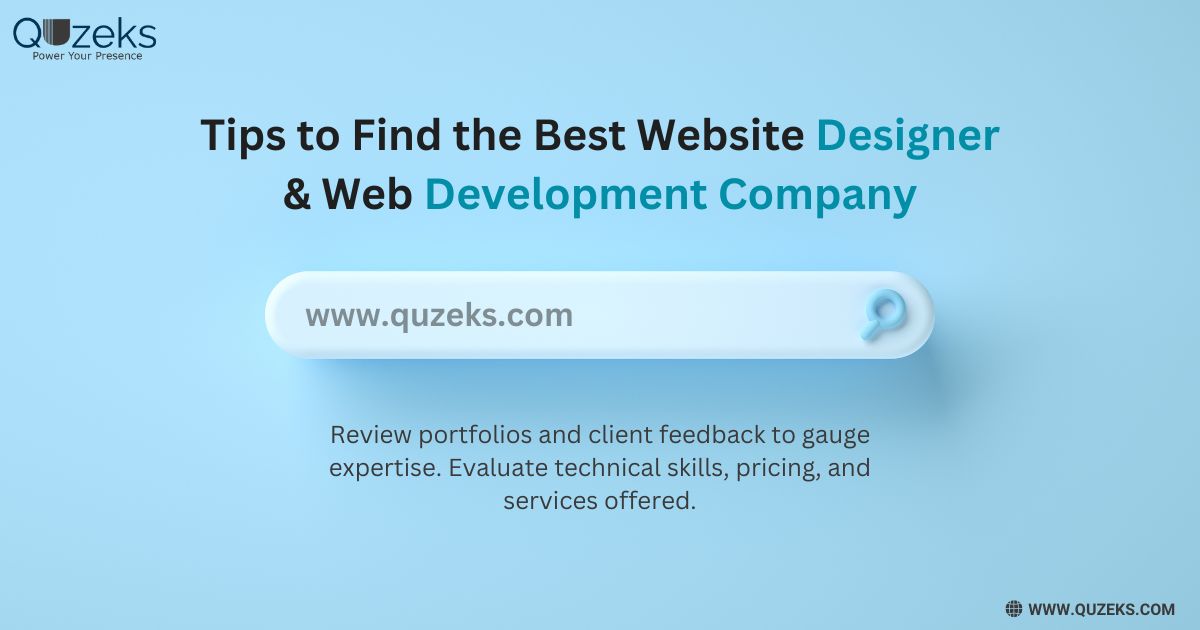- In today’s digital world, having a well-designed website is crucial for businesses and individuals alike.
- Whether you’re starting a new project or looking to revamp your current site, finding the right website designer can make all the difference.
- Here are nine tips to help you find the best website designer for your needs.
Why should I find a website designer?
Finding the right website designer involves several steps:
Limited Time for Website Development
- Designing a website takes time, and it’s a task that demands attention to detail.
- If you’re strapped for time with other business priorities, hiring a website designer is crucial.
- They can dedicate the necessary time to create a custom design that sets your business apart.
Lack of Website Building Experience
- Building an effective website requires experience.
- Without it, crafting a site that drives results can be challenging.
- Professional web designers have the expertise to optimize user experiences and convert visitors into customers.
Need for Effective Results
- Designing a website isn’t just about looks; it’s about functionality.
- Elements like videos and strategic calls-to-action can significantly impact user engagement and conversions.
- A skilled website developer can implement these elements to ensure your site achieves its goals.
Desire for a Unique Website
- Standing out in a crowded online market is essential.
- While website builders offer convenience, they often lack the ability to create a truly distinctive site.
- By hiring a website designer, you can ensure your website is tailored uniquely to your brand, providing a memorable experience for your visitors.
Tips for Finding the Best Website Designer
Here are top 9 tips to find the best web design and web development company:
Determine Your Budget
Before starting your search for a web designer, it’s crucial to establish your budget. There is no industry-standard pricing for website design, so having a clear budget will help you set realistic expectations and guide you in selecting the right provider. Your budget, aligned with your goals, will influence the level of design you can afford and where you should look for your design services.
Choose the Type of Design Company
The web design industry is vast, offering several types of service providers. Understanding the differences can help you find the best fit for your project:
Freelancers: Freelancers are often the most affordable option. They offer varying levels of skill and professionalism. While some freelancers provide excellent service with good communication and timely work, others may not be as reliable.
Design Agencies: Design agencies consist of small to medium-sized teams working together. They tend to be more expensive than freelancers due to their collective expertise. Agencies offer frequent communication, high customization, and quick turnaround times.
Full-Service Agencies: Full-service digital marketing agencies offer web design along with other services such as:
- Search Engine Optimization (SEO)
- Search Engine Marketing (SEM)
- Pay-Per-Click (PPC) Advertising
- Video Marketing
- Content Marketing
- Affiliate Marketing
- Email Marketing
These agencies are typically pricier but provide a comprehensive range of digital marketing services, which can be beneficial if you need more than just web design.
Review Their Portfolio
Before reaching out to a web design company, examine their portfolio. Check if they have experience in your industry or with similar projects. A well-curated portfolio will showcase their design style and capabilities, helping you gauge if they can meet your needs.
Read Client Testimonials
Client testimonials provide valuable insights into what it’s like to work with a particular designer. Moreover, positive reviews and glowing testimonials suggest that the company delivers excellent service and client satisfaction. Look for multiple positive reviews to ensure a consistent track record.
Consider Additional Services
If you anticipate needing other digital marketing services like SEO, check if the web designer also offers these. Combining services can streamline your campaign and ensure a cohesive strategy. Look for full-service agencies if you need a range of marketing services.
Check Their Pricing
Understanding a web designer’s pricing is essential to find one within your budget. Pricing can vary widely based on your requirements and the complexity of the site. While many designers don’t publish rates online, some, like Quzeks, offer tools such as cost calculators to help estimate the cost based on your needs.
Ask About Their Process
A reputable web design provider will be happy to explain their process in detail. They should be able to clarify what they do, how they do it, and how it benefits your business. Beware of unclear explanations or unrealistic promises, which could indicate poor practices or a lack of transparency.
Request References
Ask potential web designers for references from clients in your industry. For example, if you’re in the home security sector, seek references from past clients in similar fields. This will provide insight into their relevant experience and working relationship.
Explore Multiple Options
Take your time to explore different web designers. Avoid those who pressure you into signing contracts quickly. Most designers offer free quotes or consultations, which can help you understand the work involved and the costs. High-pressure tactics and constant upselling are red flags for quality web design.
Find Your Ideal Website Designer Today
- Your website is a critical component of your business’s online presence.
- To ensure you get a site that meets your needs and exceeds your expectations, take the time to find the right designer.
- Whether you choose a design agency, or a full-service digital marketing company like Quzeks, make sure they have the skills and experience to deliver a high-quality website.
Web Design Prices for Small Business
Web design prices can vary widely based on the complexity of the site, the designer’s experience, and the services included. Here’s a general breakdown of web design costs for small businesses:
Basic Website: $500 – $1,500. Ideal for simple sites with a few pages and basic functionality.
Standard Website: $1,500 – $5,000. Includes custom design, more pages, and additional features like contact forms and basic SEO.
E-commerce Website: $5,000 – $10,000. Necessary for online stores with product listings, payment processing, and advanced features.
Comprehensive Website: $10,000 and up. For complex sites with custom functionality, extensive content, and integrated marketing tools.
Remember, investing in a professional website can significantly impact your business’s success. Choose a designer who can deliver quality work within your budget.
Conclusion:
Investing in a professional website designer is investing in your business’s success. By following these tips and doing your research, you can find a designer who understands your needs and delivers a website that boosts your online presence. Take your time, compare options, and choose wisely to ensure your website represents your brand effectively.
References:
- Web Development By Wikipedia [1].
To find the right website designer, start by setting a budget. Identify whether you need a freelancer, design agency, or full-service digital marketing agency. Check their portfolios to ensure their style matches your vision and read client testimonials for reliability. Understand their pricing to ensure it fits your budget. If additional services like SEO are needed, see if they offer them. Finally, consult multiple designers to compare options before making a decision.
To calculate a website’s price, consider scope (design complexity, features, content size), development time (template vs. custom), and ongoing costs (domain, hosting, maintenance). Location and developer expertise also affect pricing. Get quotes from multiple providers for accurate estimates and compare costs versus quality.
To analyze a website design, check usability, performance, and visual design. Evaluate content for engagement and SEO. Review functionality and test all features. Analyze SEO elements like meta tags and keywords. Gather user feedback to identify improvements.



